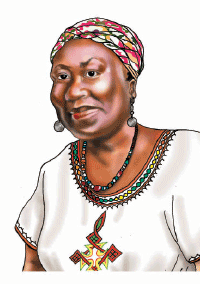The early morning sun in Kigali is scorching. Just some minutes after six o’clock, I had to jump out of bed to pull the curtains of my room because the sun was shining so powerfully into my face. My mind was too tired to remember to do so before going to bed because I had returned to the hotel late the previous night. It had been a very long day, the second and final one of the Fourth High Level Dialogue on Democracy, Human Rights and Governance in Africa to which I had been invited by the African Union. This year’s focus was on Women’s Equal Participation and Leadership in Political Parties, and since having taken part in the last presidential elections I have been getting invitations to attend such meetings dealing with women’s roles in leadership and politics.
As I took my morning walk today up and down the “one thousand hills” of Kigali, I suddenly realised that I was the only one wearing sun glasses. I could not believe that people would not go around wearing them in this place – even those who were walking straight towards the naked sun. I wondered, were their eyes so used to looking at the sun directly, or was there an unwritten law against the use of sun glasses? You know, these Rwandans are so disciplined: they may actually see the sun as one of the blessings of nature upon their land and thus find it unacceptable to demonstrate some kind of rebellion against it by shielding their eyes from its powerful glare. Anyway, I did end up seeing one other individual wearing sun glasses – but it was a foreigner like me, a man apparently from an Arab country.
The Rwandans’ discipline is evidenced probably most convincingly in the cleanliness of their country – there is not a single garbage dump to be seen anywhere; no piece of paper, plastic bag or bottle littering the streets. Even at the local market, there was such cleanliness, such orderliness. All visitors are astounded by it, even those coming from Western countries which are known to be relatively clean themselves. How did this happen? Well, the story is told that after assuming power, President Paul Kagame, Rwandan’s larger-than-life leader, would stop his car, get out and actually pick up garbage from the streets. Of course, that would have been given good coverage by the local media. After some weeks of maintaining that practice, it is said, the rest of the population apparently got the message, and now no Rwandan even thinks of letting something drop from his or her hand on to the street. That would be the day indeed, wouldn’t it, to see a president of the Federal Republic of Nigeria, getting his hands dirty picking up garbage from our streets!
Now, you hardly meet a Rwandan who is not completely head over heels in love with President Kagame! At the conference, all the Rwandan participants sang his praises, from the Ministers in attendance to the university students who made comments; I was wondering, were they required, compelled to do so? When we visited a couple of villages around the town of Rwamagana in the Eastern province, the villagers danced to songs extolling his virtues as a leader. My critical mind went: Trust Africans to constantly turn their leaders into gods – that’s part of what keeps us under-developed. However, by the end of that visit I came to understand them, even if I do not totally agree with the need to overplay a leader’s virtues. The fact is that whatever other criticism one might have against Paul Kagame, there are absolutely no grounds upon which to accuse him of being lacking in vision. That is one visionary African leader, and it is not for nothing that Rwanda has become Africa’s hottest success story, especially considering the horrific genocide which tore the nation apart in 1994. Talk of a rebound!
A major current issue drawing criticism against President Kagame is that of his potential third-term bid. Rwandans will vote in a referendum on December 18, 2015 on a constitutional amendment to allow him to seek a third term in office. Some Western countries, led by the United States, have called on Kagame to set an example in the East African region by stepping down when his current term ends in 2017. While he is yet to actually decide whether he will be running or not (a decision which might come after the referendum), Mr. Kagame has accused “other nations” of interfering in his country’s internal affairs. Nonetheless, the Rwandan president enjoys very strong support from the United States and the United Kingdom: they acknowledge that he has used aid money “more effectively than his African peers”, as stated in a BBC report. There is incontrovertible evidence in support of that fact. It is clear that Rwanda is a country that is being efficiently run; good governance is not just a cliche to which they pay lip service, it is a tangible reality.
All is not perfect in Rwanda, certainly. There is much that escapes the visitor, which only the nationals experience and can talk about – once they have gained your confidence. But even then, there is a great deal that other African countries can learn from the Rwandan example. A phrase which kept popping up during our conference was “political will”. That is what it all boils down to, ultimately.


